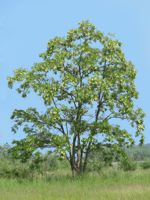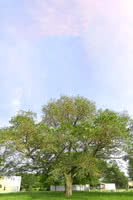Mon-Fri 9am - 5pm Mountain time
Black Locust vs Discovery Japanese Elm
Robinia pseudoacacia
Ulmus davidiana var. japonica Discovery
SOLD OUT
NOT AVAILABLE THIS SEASON - MIGHT RETURN
Black Locust is an attractive tree. Its distinctive leaves are made of about a dozen bright green leaflets. It also notable for its fragrant white flowers, which smell of citrus.
Black Locust can grow in many situations, but prefers dry areas with lots of sun. It is robust and is an excellent choice for establishing shade in dry, open areas.
Important note: Much of the Black Locust is toxic to humans and livestock, including seeds, bark, and leaves.
Discovery Japanese Elm is great for anyone who doesn't have a lot of time to maintain their trees as it doesn't drop many seeds. It has beautiful dark green foliage and is resistant to Dutch Elm Disease. This elm is similar in shape to the American Elm but is roughly 30% smaller. Instead of having an irregular and broad-shaped crown as other Japanese Elms do, the Discovery Japenses Elm has symmetrical branching, an upright growth form, and develops a classic vase-like crown.

